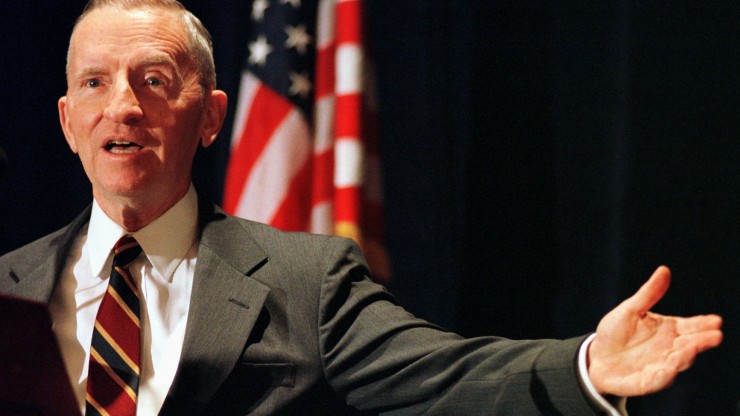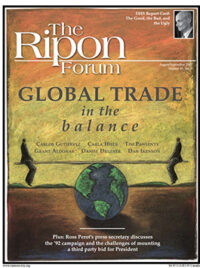
Being the first person Ross Perot hired to help him run for President 15 years ago, my signing up as a founding member of Unity 08, a group dedicated to a third party ticket for President next year, should come as no surprise. The world is filled with men of small hope and a history of futile gestures.
Hope is alive, if barely, because if ever there was an opportunity for some independent-minded statesman to step into this bog and right the listing ship of state, this is it. The common refrain among those of us who helped build the Perot movement is, “If only we had him now.” The table appears set.
The common refrain among those of us who helped build the Perot movement is, “If only we had him now.”
For a third party to succeed, one of the two majors has to be in trouble. We have one — the splintered wreck left by the “uniter not a divider.” Another essential is the absence in either party of an obviously well qualified, credible and charismatic nominee. No sign of one yet. A third necessary element is a galvanizing issue that will bring together people who basically hate each other but agree that the two-party system isn’t producing effective leaders. And there they are, all washed up on the same island by the wake of the miserable Iraq invasion.
But then there is the futility. Still missing at this juncture is the element most critical to third party success — a legitimate alternative candidate able to lead the disparate, potentially powerful and ever-growing band of the disenchanted.
Two third party candidates in history who fit that mold and had the most success challenging the system — Perot and President Teddy Roosevelt, who formed a third party after losing the Republican nomination in 1912 — both lost. But unlike most of the other hapless third party also-rans, Roosevelt and Perot each had significant impact on public policy. Though it is all for which dedicated reformers can realistically hope, impact has not always been in the best interest of even the mutineers, much less the Republic, and may well not be this time either.
Roosevelt’s success should bear an asterisk because as the incumbent President he faced none of the usual obstacles facing third party challengers. But he did change history. His 27.4 percent of the vote, the most of any third party candidate, insured the defeat of William Howard Taft, his former party’s nominee, and handed the White House to Democrat Woodrow Wilson.
Perot, who got the most votes ever — nearly 20 million — changed things, too. He is often but falsely credited with the defeat of President George Herbert Walker Bush. Although Perot probably cost Bush some states, exit polls show that Bill Clinton’s voters were so evenly split between Bush and Perot that his electoral advantage could not have been overcome. Perot’s real contribution came in shaping the debate. The candor and vigor he brought to television politics and the tone of his media message clearly steered the 1992 election discussion away from a character assassination contest where it was headed and focused it on the economy. By forcing the two parties to acknowledge and debate the then massive federal budget deficit, Perot jammed a balanced federal budget down Washington’s throat. And it was directly from Perot campaign literature that Republicans took many of the principles for their successful 1994 Contract With America reelection campaign that eventually stripped away Democratic control of Congress.
The resulting GOP dominance of both the House and the Senate fostered some of the most rancorous partisanship in history and the very gridlock Perot had campaigned against. Unbridled partisanship has so paralyzed the federal government for the last 20 years that no poll, no matter its source or bias, can uncover significant public confidence in either the President or the Congress. Congressional scandals, White House arrogance and the perception of decrepit government at every level have again opened the giant chasm of public disaffection where third parties lie dormant. In the memorable words the founder of United We Stand once used to describe jobs that would be lost under NAFTA, the next “giant sucking sound” you hear will be independent candidates rushing to fill the void.
His decision to quit in mid-campaign… was not the hasty decision of a petulant man, as many of his detractors would have you believe. Rather, the underlying factor was the very real possibility of looming success.
A lot has changed in the last 16 years, but not the difficult nature of third party challenges. That’s not all bad because all third party challenges are not good for the country. For instance, contrary to the media-fostered myth, Perot was not just another rich egomaniac trying to become the most important man in the world. Rather, he was in fact the perfect leader for a third political party taking on a system designed to work best with only two, because Perot had no desire or intention to be President. All he wanted was change.
Those of us involved from the outset of the 1992 campaign were in concert that Perot’s quest was not for the power of the White House but for reform of the way Presidents get there. Even some of the campaign professionals who came and went didn’t realize that winning was never a goal; that the campaign itself was an attack on the money-driven, emotionbased, reality-distorting process from which they made their living and which Perot felt was corrupting not only the electing but the governing.
Unfortunately, then as now, campaign reform had no resonance as a galvanizing issue with the media or even our own reform-minded volunteers. Our alternative issue was the budget crisis which Perot pledged to “get under the hood and fix.” Around it we built the antithesis of a typical campaign: no press planes, no spinning, no image advertising, no character attacks, no opening of sock drawers for inspection by reporters.
Only it didn’t work.
So now, even more and more millions are needed to fight what amounts to an image distortion war on an ever-increasing number of media fronts. Anyone who seeks the office must have both an obscene amount of campaign cash and a turtle shell defense against character assassination. Additionally, a third party candidate must also be shrewd and tenacious enough to overcome the same old barriers constructed by the two major parties that have been virtually “constitutionalized” over the years. Through long dominance of state legislatures, Republicans and Democrats have littered the landscape with laws making ballot access a nightmarish adventure for both independent candidates and their voters.
Wealthy, high profile candidates — such as Perot and New York Mayor Mike Bloomberg — have a big advantage of not having to start early to raise money. So they can wait until the time is right. There was talk of Perot running as early as the fall of 1991, but not even he took it seriously until after the public reaction to his interview with Larry King on CNN the following February. By then, a Bush-Clinton general election was clearly in the cards and an unsettling prospect for many. Two months later, without spending a dime on television or radio, Perot was leading them both in the polls. Public interest in alternative candidates simply will not rise significantly until the number of Republican and Democrat hopefuls has dwindled and available choices are clear.
Unity 08, led by disenchanted veterans of both major parties, has been raising money and building an organization for months. Yet its planned online nominating convention won’t take place until next June when there will be more bigname candidates from which to choose. Already, hundreds of thousands of committed independent voters are anxiously waiting this moment of disappointment, as are a handful of potential nominees now posing as major party candidates. Though none are likely Presidents, the combination of computer networking, web-based fundraising and voter unrest guarantees them a chance — of at least having impact.
All will argue, as we did in the Perot campaign, that the more voices heard during the presidential election the better. James Madison argued this very thing, terming this collective political debate “the public voice,” which he believed was the critical element in democracy’s most important decision-making process.
Over the years, with a few exceptions such as Roosevelt and Perot, third party voices have had scant impact on either election outcome or public policy. But the disproportionate rise in influence by extremists within the two major parties is changing that. A resulting proliferation of splinter groups and single-issue candidates suggests all future U.S. Presidents may be routinely elected with less than majority support. George W. Bush has already proved that not even winning the popular vote is necessary. Such a climate makes third party campaigns easier to mount and potentially more powerful than ever. But however much this has emboldened the mutineers, they should be equally terrified by the unintended consequences of their mutiny.
Ralph Nader’s popular vote in Florida in 2000 deprived Al Gore of the necessary electoral votes to defeat Bush. It also guaranteed his constituency eight years of public policy they abhorred, and may well have assured the country of the abominable and interminable Iraq war, which could go down as our greatest foreign policy mistake ever.
Yet Nader is again making noises, increasing the chances that there will be more than one big name independent siphoning off votes in November 2008. What chance do we have that any of them will understand the gravity of their pursuit as well as Perot? His decision to quit in mid-campaign in 1992, which obviously cost him any chance of influencing the outcome, was not the hasty decision of a petulant man, as many of his detractors would have you believe. Rather, the underlying factor was the very real possibility of looming success.
Those of us involved from the outset of the 1992 campaign were in concert that Perot’s quest was not for the power of the White House but for reform of the way Presidents get there.
The last thing Perot wanted was for his reform crusade to garner enough electoral votes to throw the Presidential election into the House of Representatives, where a vote along party lines could negate the popular vote. “What kind of reform is that?” he once asked me. His concern was painfully alleviated by his comic pullout and re-entry, which became necessary only because the networks refused to run his purely educational advertising campaign on the budget crisis — the very reason for his running in the first place. The derision and embarrassment accompanying the turnaround was of little consequence to a man who believes the responsibility that accompanies citizenship only increases for those who seek to lead citizens.

Like a lot of other former Perot “volunteers,” my option to support a third party candidate next year remains open — just in case. But the far better path for America is for the Democrat and Republican parties to reject the radicalism on their fringes, vent the intolerance in their hearts, and muzzle the morally bankrupt, counter-productive, anything-goes politics which has become so prevalent these days.
A third party is not needed. A lone Republican or a Democrat will do, as long as he or she is a passionate patriot, good, smart and tough. Like a candidate I once knew. Little guy, talked fast, wore suspenders.
Jim Squires is an author, the former editor of The Chicago Tribune, and media advisor to Ross Perot. He now owns a horse farm in Kentucky, where, among other things, he bred the winner of the 2001 Kentucky Derby.
* * * * *
Squires’ Rules for Third Party Success:
1) One of the two major political parties has to be in trouble.
2) The absence in either major party of an obviously well qualified, credible and charismatic nominee.
3) The presence of a galvanizing issue that will bring together people who may disagree politically but share an overall belief that the two-party system isn’t producing effective leaders.
4) The appearance of a legitimate alternative candidate who is able to lead the disparate but potentially powerful band of voters who are disenchanted with the major political parties and are willing to look at a third political party for a candidate to support.




